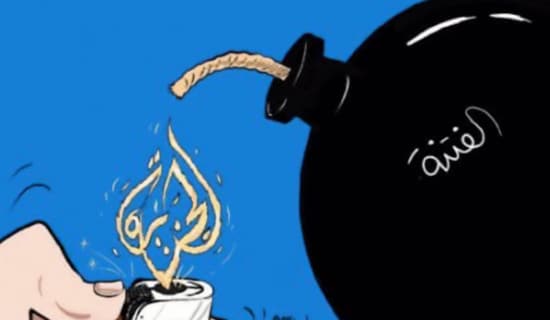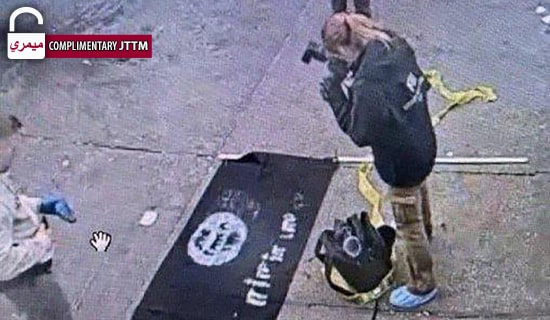The Arab League summit meeting held in Beirut at the end of March was characterized by two major events—one substantive and the other symbolic. The substantive event was the unanimous vote in favor of Crown Prince Abdallah's proposals for peace between Israel and the Arab countries. The symbolic act, which is the subject of this analysis, was the famous kiss between Crown Prince Abdallah and Iraq's Vice President Izzat Ibrahim Al-Douri who, in a dramatic gesture for the photographers, donned a Saudi-style clock on top of his impeccably tailored western-style suit and necktie.
Beyond the symbolic gesture of the "kiss" there have emerged many signs, political as well as economic, which suggest the start of a reconciliation process between the two Arab countries which have broken their diplomatic relations following Iraq's invasion of Kuwait and the subsequent "Desert Storm" war against Iraq in 1991, launched from Saudi Arabia.
Political Aspects of Reconciliation
Perhaps the most significant aspect of this reconciliation is Saudi Arabia's unwavering refusal to be drawn into any military campaign by the United States against Iraq. This Saudi position was conveyed unequivocally by Crown Prince Abdallah during his meeting with President Bush on April 25.[1] It was reiterated again by Prince Abdallah in an interview with the London-based Saudi-owned daily, Al-Sharq Al-Awsat which quotes the Prince saying: "We are against an attack on Iraq and we hope the situation will not come to that."[2]
The semi-annual meeting of the Gulf Cooperation Council (GCC) which met in Jeddah, on May 25 under Saudi leadership, took note of the progress made in Beirut with regard to Iraq and called on that country to take concrete measure to implement the steps agreed upon at the Beirut summit (most notably steps relating to the Iraqi-Kuwaiti relations and the preservation of Kuwaiti sovereignty) to ensure stability in the area and support the causes of the Arab world. Abd Al-Rahman Al-Attia, the Secretary General of GCC underscored "the good intentions" of Iraq which could mean faster normalization between Iraq and the Gulf countries.[3] The Iraqi daily Babil, which is owned by Saddam Hussein's eldest son Uday that reported on the GCC meeting, considered the outcome as positive for Iraq.[4]
Most recently Saudi Arabia, which still has no diplomatic relations with Iraq, has responded affirmatively to Iraq's request to designate an Iraqi ambassador to the Organization of the Islamic Conference in Jeddah. The ambassador, who will occupy the closed Iraqi consulate in Jeddah as his headquarters, would eventually handle future contacts between the two countries.[5] Subsequently, the Babil which is owned by Saddam Hussein's eldest son Uday, has speculated that Muhammad Majid Al-Sa'id, President of Saddam University for Islamic Studies, is the likely candidate for the position.[6] The paper also quotes unnamed Saudi diplomats expressing their country's satisfaction with Iraq's termination of the anti-Saudi propaganda.
Economic Aspects of Reconciliation
The thawing in political relations between Iraq and Saudi Arabia is accompanied by intensified economic activities. Perhaps the most significant development is Saudi Arabia's decision to reopen the land crossing at 'Ar-'Ar between the two countries which had been closed since 1991.[7] Initially, Saudi trucks, loaded with Saudi exports, will be allowed to cross the border to Iraq. At a later phase trucks from other Gulf countries will also be permitted to cross the border with Iraq. This would mean savings of 8-10% the cost of shipping which, henceforth, went through Jordan. Iraq expects to import as much as $1 billion annually from Saudi Arabia.[8]
For strictly political reasons, Iraq has had a habit of inflating the volume of trade from Arab countries to exaggerate the level of political cooperation. The Saudi exports are a case in point. At Iraq's request, the Center for the Growth of Saudi Exports has agreed to allow Saudis to re-export to Iraq goods imported, mainly from Asia, for the Saudi market. It would mean that the Iraqi consumers, unless they are subsidized—and no one knows for sure how the pricing mechanism in Iraq works—will have to pay a higher price for the goods that are being re-exported from Saudi Arabia to Iraq. These goods would include a profit margin for the Saudi businessmen at no risk to themselves. Since the Iraqi trade is largely controlled by Saddam's family and close friends associated with the ruling Ba'ath party one must suspect that the Saudi middlemen's income would be shared by their interlocutors in Baghdad.[9]
There are two other news items which suggest the deepening of economic relations between the two countries. The first relates to the approval given by Maysar Rajaa Shallah, Iraq's Minister of Industry for the construction in Iraq of a wholly-owned Saudi factory for the manufacturing of irrigation tools. The amount of investment was not revealed.[10]
The second news item has a considerably more strategic significance. Iraq has announced that it has rehabilitated the Iraqi section of the oil pipeline which connects Iraqi oil installations in the south with the Saudi Port of Yanba' on the Red Sea. The pipeline was closed by Saudi Arabia in 1990. When fully operational the pipeline can carry 1.65 million b/d of Iraqi oil. In June, 2001, Saudi Arabia informed the United Nations that it had confiscated the Saudi part of the pipeline.[11] Hence, it is not clear whether the rehabilitation of the pipeline on the Iraqi side of the border was carried out in prior agreement with the Saudi Government.
Jordan – The Primary Looser
The opening of the border crossing at 'Ar-'Ar could deal a big blow to the Jordanian transit trade with Iraq. The Saudis expect ships to choose the port of Jeddah which is the largest port on the Red Sea in lieu of the Port of Aqaba in Jordan. Perhaps more significantly, Saudi manufactured goods, known for their high production standards, will displace Jordanian and other Arab manufactured goods on the Iraqi market.[12] Once loosing its transit role, Jordan must ponder whether Iraq will continue to provide it with oil at discounted prices.
[1]Prince Abdallah's Visit to the U.S.: Saudi Press Perspectives.
[2] Al-Sharq Al-Awsat, May 11, 2002, and reprinted in Okaz (Saudi Arabia), May 12, 2002.
[7] 'Ar-'Ar is a unique Saudi town completely designed and built 50 years ago by the Tapline oil company. The story of 'Ar-'Ar is covered by Al-Jazirah (Saudi Arabia), May 25, 2002. Also Al-Hayat, May 23, 2002.
[8] Babil, May 23, 2002. The $1 billion trade is mentioned by Muhammad Mahdi Saleh, Iraq’s Minister of Trade, in Babil, May 11, 2002.
[9] The idea of inflating the trade between Iraq and Saudi Arabia is discussed by Babil, May 18, 2002.
[12] Al-Watan (Saudi Arabia), May 31, 2002.
*Dr. Nimrod Raphaeli is Senior Analyst of MEMRI's Middle East Economic Studies Program.




